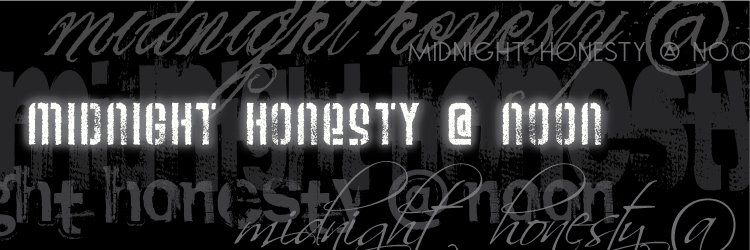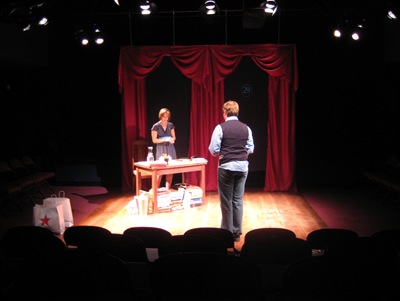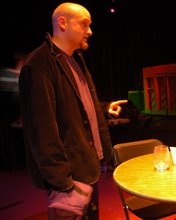Tuesday, November 25, 2008
Monday, November 24, 2008
The End
The Nina Variations run is over, the set struck (all of 45 minutes) and so a chapter is closed. I’ll have a broader post-mortem later, but for a show that was successful primarily because of its first rate cast and top notch writing there is no better eulogy than the text itself. So for now I leave you with some favorite lines from the show.
- “You have form enough. You have paper in front of you. You’ve twenty-six letters and thousands of days. And you have a piece of God’s own mind in your blood. A mind that knows no horizon. How dare any of us say we need more than that?”
- “How Long!? This is only one answer to that question – the question that always pours out of the mouths of the stupid people who’ve done nothing with their lives but sit back in fat contempt, smothering the dreams and ridiculing the attempts of those foolhardy – no, courageous – enough to put their desperation into words. How long did it take me to write this play? The same to it takes to write every play: one entire life. That’s how long.”
- “We are tricked by youth. It teaches us that new adventures will arrive each day. And, like misinformed children, we carry this lie onward into our lives. And what arrives instead – day after day after day – is sameness. Habit. “Form.” And, thus we have but one goal: to build a life which will accommodate boredom.”
- “If we can’t form strong opinions about something we know nothing of, how can we ever fall in love?”
- Nina:… You can’t let circumstance dictate the ending. A pencil sharpener breaking – a random event like that-
Treplev: Why not? How better to end than through chance?
Nina: But Kostya--
Treplev: What could be more like our lives? - “What right has the future to demand ignorance of us? Out fault is in asking too little, in waiting – like foolish, obedient dogs sitting in the rain – waiting to be told our fate. We carry all the future we need – here, in our heads and hearts. So, let us invent it Nina. Let us shape it to suit our needs. So, that when we arrive… the future will be like a familiar room. Each small object in its place. Home to a thousand quiet comforts.”
- There was a time, I had quiet epiphanies.I’m hungry. I like him. The lake is lovely. That song is sad. There was a time when I was mystery, and not monologue.
- I’ve decided that critics are our salvation. They are the wisest, kindest, most caring, most committed people in all the world. They are selfless, compassionate individuals who have sacrificed their own assuredly great careers as artists – in order to give those of use with lesser talent a fighting chance.
- Nina: It’s a very good play
Treplev: Thank you. But?
Nina There are no people in it.
Treplev: That’s true. And?
Nina: And nothing happens in it. - “And now I know, Kostya. I understand that in our work the main thing is not fame, nor glory. Not the things I dreamed about… But the ability to endure. To endure whatever trials fate has in store for you – without losing faith in yourself. I have that faith now. And I am not afraid of life.”
Posted by Travis Bedard at 2:47 AM View Comments
Wednesday, November 19, 2008
Hating the suck…
or “You can’t lead a horse to water if he’s convinced that he only needs Diet Coke(tm)”
Adam Thurman is one of my must-reads. Granted, on my particular RSS bender that means he’s in my Top 50 but that’s not bad! One the reasons I most love reading him is because he writes as unapologetically in his way as Don Hall. I don;t have to parse what Adam is saying, he just says it.
Which isn’t to say that I don’t disagree sometimes, I do, I just like that I know when I disagree with him.
This of course is one of those times.
Adam says in re: his public speaking competitors:
“And the truth is, a lot of them sucked. They were (in my eyes) horrible speakers, who bought nothing new or interesting to the table.
As I watched these mediocre (but well paid) speakers do their thing, a huge smile started spreading across my face. I'll explain why in a sec.
When my time to speak finally came, I busted my ass to deliver the best content I could. I used every trick in my "public speaking" bag. When it was done, I was exhausted but the audience loved it.”
Alright there’s nothing to disagree with there. That’s just right.
But it doesn’t apply to me. I don’t think it applies to anyone in Austin, and I’m not sure it applies to anyone in “indie theatre” in 2008. That’s not to say that there isn’t bad theatre going on here, there or anywhere, that sure would be idiotic of me, but we don;t really have The Big Boy Producing Crap here in Austin. We have road houses for that, and the road houses aren’t sucking the oxygen out of the room for us.
The biggest boy on the block here in town is the Zach Scott Theatre and to a lesser degree Austin Shakespeare. Both are aggressive living organizations, they may make missteps, but it’s not due to lowest common denominator serving (they use Christmas moneymakers to fund a pretty reasonable season).
The tier under those two (funds-wise) are high profile innovating small theatre groups. Many have their own spaces, but not all of them. I’m in the third tier and I think you have a pretty good idea of what I’m about.
But Zack or Austin Shakes or TexArts or Salvage Vanguard or the University programs sucking does me no good.
Why?
In Adam’s parable he is in a closed system with his competitor. The audience is going to see them both. So the only thing you have to do is be better than your competitor.
That’s not the problem I face.
My potential audience isn’t in the habit of going to the theatre.
They don’t have a vocabulary for it.
They’re unsure of the rules.
My primary (successful) marketing is still acquaintance/personal touch marketing. I have to teach them how to watch and where.
I’m not competing with my big brothers, waiting to take over when they fail (or target a LCD), I’m competing with their memories of t hat time their daughter did a skit in the second grade. I can talk all I want about my potential audiences love of brand, but when they have no vocabulary it doesn’t even matter if the Gatekeepers give their blessing on your production.
I am part of a known entity producing team with recent local awards nominations for our work, three glowing reviews, and polished publicity materials for a respected show by a known local playwright.
[PLUG]
Good seats still available for the final three performances!
[/PLUG]
I will be over the moon if I clear 150 paid.
That’s ridiculous.
But to improve it? I need for every time that theatre touches a person in this town for it to be positive. I need for them to be leaning towards me when I approach them, not away. I need for them to have seen a Vortex show that one time, of their friends took them to see the Rude Mechs, and it needs to be positive or even personal touch marketing won’t work.
I need (and will be spending the rest of my time in Austin) to have a united front up and down the funding ladder. We need to be talking to each other and helping each other. We must hang togther, else we shall most assuredly hang separately.
I also really want to amend Austin’s second most pretentious t-shirt slogan (after Keep Austin Weird):
Posted by Travis Bedard at 11:39 PM View Comments
Wednesday, November 12, 2008
Content about content.
Tony Adams causing a ruckus again. You’d think he’d be distracted by imminent natal events but noooooooooooo.
I don’t know why you don’t post more about the content of your (or others’) work.
Why don’t I?
A LIST!
- Time
To talk about content you need to do your homework. Or rather, I need to do my homework. I can stand publishing half baked thoughts about something, it makes my itchy. That takes me a long time. - I’m a coward.
I can tear apart others’ work as well as you can. I just know that I need these people later, so I talk to THEM about it, not you. - This thing is turned on!
This blog exists as a record of all of my work, I’m not going to talk down the core of what my company is doing and leave a bread-crumb trail. But I tear apart my own work mercilessly. I’m not in this to be mediocre, so I am constantly trying to improve. And I share that fairly unvarnished look at my personal work which I don’t mind being accountable for to whoever chooses to hold me to it. - No one cares.
500 words is about the limit. After that people skip it. “But I read EVERYTHING”. Maybe you do, but most people don’t and I don’t need to publically share my breakdown of something if there’s no one on the other end of the line. (This does not invalidate #3, search exists).
/List!
In addition? RVCBard is more naked about process (and content) than anyone I can think of, but I am wary of participating in any way despite the implied permission, because I’m not a partner to that process. I think the same would be true if I were to open up about personal content issues here.
But the biggest single reason I don’t blog about content?
That’s not what I do.
That’s not my explicit part of this process. I do just about everything but content creation on most projects. On The Nina Variations I am the producer, the scenic and lighting designer, and the master carpenter and electrician. Will, Rachel or Aaron are in prime positions to talk about the text, or the production process, but I am outside of that loop on the Venn diagram, and this space’s primary reason for existing is for me to figure me out -to suss out my own theatre philosophy.
I will discuss content with y’all on Cambiare Productions’ upcoming Orestes. Will and I will be crafting content for that, and I will have thoughts on both the content itself and our process for it.
As a side note to you content junkies: Art Street Theatre (who I want to be when I grow up) published a book reviewing their first five years. It is an energizing piece of work. It delves into their collaborative creation process and the success of each part of that process. I’m not sure if Mark even still has copies available, but you can try to order that here. You can’t have mine, it’s on the Nina Variations set.
Posted by Travis Bedard at 1:07 PM View Comments
Tuesday, November 11, 2008
Blessed are the feet of him…
Waiting to see The Nina Variations until you get some positive feedback?
AustinLiveTheatre would like you to look here:
"...this was the most deeply satisfying theatrical experience I’ve had since beginning my exploration of Austin theatre last year."

"...Add to that intellectual stimulation the fact that the acting is of the very highest quality. It had to be – with two characters working one another and working the text, any false note would have thrown the whole exercise into the “interesting but so what?” category. Their pacing, silences, concentration, gestures, congruence of character to the originals in The Seagull – nothing was lacking."
"Gobotrick’s Nina Variations is a brilliant, consistent, heart-rending series of riffs on Chekhov’s characters, one which preserves Chekhov’s sensibilities and reminds us gently and insistently that life is here, life is now, life is immediate, and all our choices are full of meaning."
Now will you come and see it?
Also?
If you’re in Austin or it’s environs I highly recommend that you hi yerself to Tutto Theatre’s Ophelia over at the Blue Theatre. I caught the Sunday show and it’s worth every penny. If you’re a Shakespeare nerd you should have to pay double. It’s a retelling of Ophelia’s story between the pages… effectively the offstage life we are normally deprived unfolds as we watch five Ophelia’s erode into singular madness.
Posted by Travis Bedard at 4:55 PM View Comments
Thursday, November 06, 2008
Walking the Walk
I have talked a bit about my feelings regarding indie theatre design aesthetics, and you know that I try to hold myself accountable for living up to my own bumperstickers, so with The Nina Variations (good seats still available!) open: let’s go get my report card.
To review in brief:
- Stop complaining about the budget.
- Leverage technology.
- Leverage the two things indie theatre (usually has):
Willing help and time. - Design within your skill limitations.
- Design far enough to look good, and not so far that you can’t make it look finished.
- Design to your mission statement.
If you are a text focused, or actor/director focused troupe… don’t drop your entire budget on the aesthetic.
This was my lab really.
I had no constraints on the design. The only limits were a budget of about $700 and my own paltry carpentry skills.
The goals:
A tight isolated playing space on the floor of the theatre rather than the stage. We wanted to mask the stage off from the audience and play the show in a vary intimate 100 seat 3/4 thrust. I needed a projection surface for the variation numbers and room for a desk.
Everything else was up to me.
I decided immediately that I wanted a wide plank floor.
In looking at image after image online of plank flooring we knew that we wanted vintage pine floors. Unfortunately… so does everyone else, and our budget wouldn’t allow for True Vintage. Instead I decided to stain the flooring, and after consulting with Will (the director) we went with a nice walnut color.
As it turns out, I am an amateur floor stainer. Not really news, but it worked in our favor. The deck look really nice and glossy under street lighting with reddish undertones. Under stage lighting however it blasts out to a farmhouse warm-yellow-brown and shows all of the inconsistencies in my application… which looks great.
For the masking I had decided on curtains because we couldn’t come up with a reasonable projection surface, and we didn’t want walls. I wanted the drape and color of the curtains to mimic traditional theatre curtains in line with my eventual design concept that they were performing this Seagull mashup on the lakeside stage (yes it was late in the process, but I got there).
The desk and chair were both happy accidents as our AD and stage manager had the right pieces. The set is dressed simply with theatre books and a few writing aids (all from my library) to block off the under desk a bit from the audience and as part of my (now apocryphal) idea that they had been doing this for longer than the length of the play. Also, in a bout of no foresight, I didn’t treat the underlayment, and didn’t finish the sides of the planks. Thus the inevitable seams showed brand new raw wood. Not acceptable.
In a funny moment that can only happen after a long day of load-in I asked myself what my wife’s friend Sarah would do. Now Sarah is briiliant, she was one of the designers/creators of Transformations this spring, and she stops at nothing to Get It Right. So playing What Would Sarah Do? is a worthwhile game. My tired brain said that Sarah would mix paint with the sawdust (on stage proper) and essentially grout with it. I was going to do no such thing. I had no paint, not enough sawdust, and would make a huge bloody wreck of the whole thing. “Well. Alright. I just need to cover the raw wood. I don’t need to ‘treat’ it… dirt. I’ll just sweep dirt into the cracks!”
And I did. I took some potting soil in on Tuesdya and spent a half-hour or forty five minutes sweeping dirt into the cracks. It covered (or dirtied) the raw wood, it took the high gloss of my onecoat poly/stain AND it took care of all but the biggest creaks in my floor. (Thanks Sarah!)
Also, in a sidebar.. our space is an older municipal building, and it smells like an older municipal building. So we mist with clove oil… control the experience as much as you can.
Overall, (dirt aside) the results are very clean if still imperfect. My “lighting design” doesn’t really serve the piece, and is too hemmed in by the chosen space layout and the need to be off the back wall. The pipe pockets on the black curtains are uneven, and I haven’t hit on a good (cheap/free) treatment for the top curtain seam or the hanging chains.
But it stays out of the way of the incredibly solid acting (once we take the curtains off the upstage lip) and most importantly: it doesn’t look cheap. There is nothing on the set found, borrowed, purchased or donated that wasn’t chosen. It may not have been the first choice, it may not be the best choice, but it wasn’t because “Well that’s the best we can do, we’re poor”.
That’s the first step.
Posted by Travis Bedard at 2:28 AM View Comments













